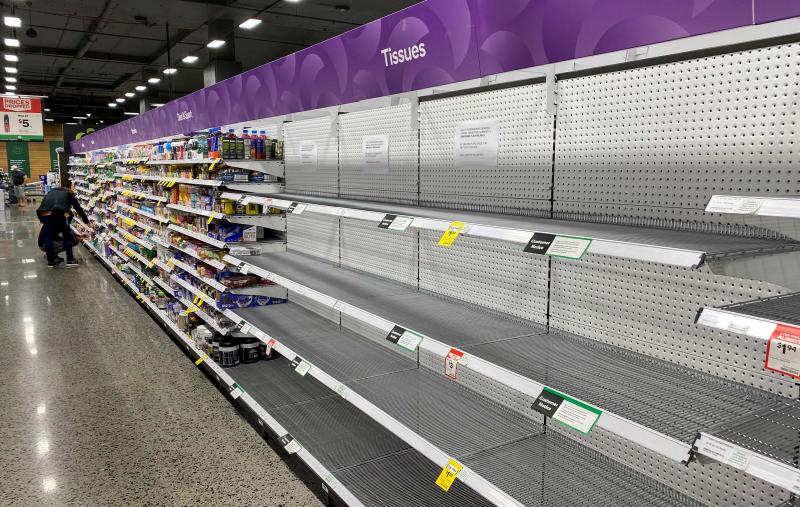Coronavirus: Australian states and capital declare state of emergency, as govt mulls second stimulus
Sign up now: Get insights on Asia's fast-moving developments

An empty shelf usually stocked with tissue is seen at a supermarket in Melbourne, Australia, on March 5, 2020. The state of Victoria declared a state of emergency for four weeks in a bid to slow the coronavirus spread.
PHOTO: AFP
SYDNEY (REUTERS, BLOOMBERG) - Australia's capital and the country's second most populous state declared states of emergency on Monday (March 16) while large, non-essential gatherings were banned in a bid to slow the spread of the coronavirus after the national death toll rose to five.
Australia has recorded nearly 300 cases of the coronavirus and authorities fear a rapid rise in the flu-like respiratory disease.
After a 77-year-old woman and a 90-year-old woman died in New South Wales, Victoria state and the Australian Capital Territory (ACT) - home to the capital city of Canberra - both declared a state of emergency that will give health officials sweeping powers.
The proclamations allows the Victoria state and ACT's chief health officers near unchecked powers to contain the spread of the virus and reduce the risk to the public.
The chief health officers will be able to issue fresh quarantine orders to cover entire suburbs, businesses or professions if deemed necessary.
"These powers have never been used before," Victorian Premier Daniel Andrews told reporters in Melbourne, the state capital of Victoria. "This, I hope provides a clear sense about the unprecedented nature of this public health emergency, this really significant challenge."
Cultural institutions including the National Gallery of Victoria, the State Library and Museums Victoria have announced temporary closures. Major events such as the Melbourne Comedy Festival and Melbourne Food and Wine Festival have been postponed.
The Victoria state of emergency will run for four weeks, while the ACT declaration will be in force for at least a week.
Western Australia state declared a state of emergency on Sunday.
Nationally, Australia is tightening its borders, with Prime Minister Scott Morrison on Sunday ordering everyone arriving from overseas to self-isolate for 14 days.
Australia has also banned non-essential social gatherings of more than 500 people, though this not apply for public transport, work or schools.
Still, many offices are asking employees to work from home and several leading universities on Monday shuttered for at least a week.
The country is also considering a second round of economic stimulus, three sources familiar with the deliberations told Reuters.
The spread of the virus has roiled global markets despite pledges of stimulus packages, including Australia's plan to inject A$17.6 billion (S$15.4 billion) into its economy.
As Australian markets slumped further on Monday, three sources told Reuters Prime Minister Scott Morrison will meet with senior Cabinet officials to discuss a potential "scaling-up" of its stimulus package.
Australia's central bank on Monday said it was ready to purchase local government bonds to support the smooth functioning of the market and will announce further policy measures later this week.
The Reserve Bank of Australia earlier pumped extra liquidity into the banking system, part of a package of measures aimed at ensuring business and households have access to credit as travel and industry are disrupted.
Cultural institutions including the National Gallery of Victoria, the State Library and Museums Victoria have announced temporary closures. Major events such as the Melbourne Comedy Festival and Melbourne Food and Wine Festival have been postponed.


